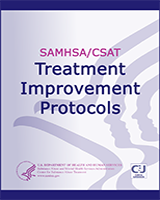NCBI Bookshelf. A service of the National Library of Medicine, National Institutes of Health.
This TIP, Substance Abuse Treatment for Persons With Child Abuse and Neglect Issues, examines treatment issues for both adult survivors of child abuse or neglect and adults in treatment who may be abusing or neglecting their own children.
Chapters 1 through 3 focus primarily on adult survivors of child abuse and neglect. Chapter 1 defines child abuse and neglect, provides rates of child abuse and neglect both in the general population and among those in substance abuse treatment, and reviews the literature on links between childhood abuse and subsequent substance abuse. Chapter 2 describes screening and assessment tools that can be used to determine whether a client has a history of childhood abuse or neglect; Chapter 3 presents guidelines on treating clients with histories of child abuse or neglect and referring them to mental health care treatment when necessary. Chapter 4 discusses the personal issues counselors may encounter (e.g., countertransference) when working with clients with histories of abuse or neglect and offers suggestions for addressing them. In Chapters 5 and 6, the focus shifts to adults in treatment who may be abusing or neglecting their own children. Chapter 5 shows how alcohol and drug counselors can identify whether their clients are at risk of or are currently abusing or neglecting their children. It discusses what alcohol and drug counselors can do to break the cycle of child abuse and neglect, including how to work with child protective service agencies within the child welfare system. Chapter 6 is an overview of the legal issues that counselors should be aware of as mandated reporters. The TIP concludes with an overview in Chapter 7 of continuing and emerging trends, such as fast-track adoption and welfare reform, that counselors will need to follow in the coming years.
Contents
- What Is a TIP?
- Editorial Advisory Board
- Consensus Panel
- Foreword
- Executive Summary and Recommendations
- Chapter 1—Working With Child Abuse and Neglect Issues
- Chapter 2—Screening and Assessing Adults For Childhood Abuse and Neglect
- Chapter 3—Comprehensive Treatment for Adult Survivors of Child Abuse and Neglect
- Chapter 4—Therapeutic Issues for Counselors
- Chapter 5—Breaking the Cycle: The Substance-Dependent Client as Parent/Caregiver
- Chapter 6—Legal Responsibilities and Recourse
- Chapter 7—Emerging and Continuing Issues
- Appendix A --Bibliography
- Appendix B --Protecting Clients' Privacy
- Appendix C --Implications of Recent Federal Legislation for Clients in Treatment
- Appendix D—Obtaining Screening and Assessment Tools
- Appendix E --Resources Related to Childhood Trauma Among Adults
- Appendix F --Resource Panelists
- Appendix G—Field Reviewers
This publication is part of the Substance Abuse Prevention and Treatment Block Grant technical assistance program. This publication was written under contract number 270-95-0013 with The CDM Group, Inc. (CDM). Sandra Clunies, MS, ICADC, served as the CSAT government project officer. Rose M Urban, LCSW, JD, CCAS, served as the CDM TIPs project director. Other CDM TIPs personnel included Raquel Ingraham, MS, project manager; Jonathan Max Gilbert, MA, managing editor; Cara Smith, production editor; Kurt S Olsson, former editor/writer; Paul Seaman, former acting editor; Y-Lang Nguyen, former production editor; and MaryLou Leonard, former project manager. Special thanks go to consulting writers Tracy Simpson, PhD, and Christine Courtois, PhD, for their considerable contributions to this document.
The opinions expressed herein are the views of the Consensus Panel members and do not reflect the official position of CSAT, SAMHSA, or the U.S. Department of Health and Human Services (DHHS). No official support or endorsement of CSAT, SAMHSA, or DHHS for these opinions or for particular instruments or software that may be described in this document is intended or should be inferred. The guidelines proffered in this document should not be considered as substitutes for individualized client care and treatment decisions.
- NLM CatalogRelated NLM Catalog Entries
- Review Coexisting child neglect and drug abuse in young mothers: specific recommendations for treatment based on a review of the outcome literature.[Behav Modif. 2004]Review Coexisting child neglect and drug abuse in young mothers: specific recommendations for treatment based on a review of the outcome literature.Donohue B. Behav Modif. 2004 Mar; 28(2):206-33.
- Review Child physical abuse and neglect.[Child Adolesc Psychiatr Clin N...]Review Child physical abuse and neglect.Schilling S, Christian CW. Child Adolesc Psychiatr Clin N Am. 2014 Apr; 23(2):309-19, ix. Epub 2014 Feb 18.
- Intergenerational transmission of child abuse and neglect: real or detection bias?[Science. 2015]Intergenerational transmission of child abuse and neglect: real or detection bias?Widom CS, Czaja SJ, DuMont KA. Science. 2015 Mar 27; 347(6229):1480-5.
- Animal-assisted therapy with children suffering from insecure attachment due to abuse and neglect: a method to lower the risk of intergenerational transmission of abuse?[Clin Child Psychol Psychiatry....]Animal-assisted therapy with children suffering from insecure attachment due to abuse and neglect: a method to lower the risk of intergenerational transmission of abuse?Parish-Plass N. Clin Child Psychol Psychiatry. 2008 Jan; 13(1):7-30.
- A prospective examination of service use by abused and neglected children followed up into adulthood.[Psychiatr Serv. 2010]A prospective examination of service use by abused and neglected children followed up into adulthood.Yanos PT, Czaja SJ, Widom CS. Psychiatr Serv. 2010 Aug; 61(8):796-802.
- Substance Abuse Treatment for Persons with Child Abuse and Neglect IssuesSubstance Abuse Treatment for Persons with Child Abuse and Neglect Issues
Your browsing activity is empty.
Activity recording is turned off.
See more...
